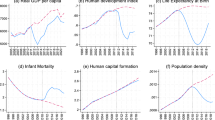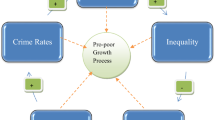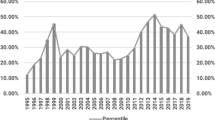Abstract
In this study, we examine how efforts taken by states to combat corruption act as a mediator in the relationship between fiscal decentralization and regional income disparities. Fiscal decentralization may affect regional disparities via access to funding, but corruption could limit the ability to efficiently transfer fiscal resources. India is one of the most decentralized nations of the world and also exhibits high regional disparities. Under this scenario, we estimate whether institutions, in the form of anti-corruption efforts by the states, interact with fiscal decentralization and affect divergence across states of India. We find that fiscal decentralization reduces the disparity across states, and the effect of fiscal decentralization is stronger under efforts to control corruption by state vigilance bodies. The results are robust across different specifications of fiscal decentralization and alternate estimation methods accounting for endogeneity. From the policy perspective, in order to harness the potential benefits of decentralization to reduce regional income disparities, governments should focus on improving the quality of institutions through control on corruption at the sub-national level.

Source: Handbook of Statistics on Indian States, Reserve Bank of India



Source: Authors. *The map indicates only those states that have been considered for this study

Source: EPWRF India Time Series Statistics
Similar content being viewed by others
Notes
The National Development Council of India has characterized the states into special category states (SCS) and non-special category states (NSCS). Special category states include the following features:1. hilly and difficult terrain, 2. low population density and/or sizeable share of tribal population, 3. strategic location along borders with neighboring countries, 4. economic and infrastructural backwardness, and 5. non-viable nature of state finances. Till now, 11 states are part of SCS (Arunachal Pradesh, Himachal Pradesh, Manipur, Meghalaya, Mizoram, Sikkim, Tripura, Jammu and Kashmir, Assam, and Nagaland). The NSCS are Andhra Pradesh, Bihar, Chhattisgarh Goa, Gujarat, Haryana, Jharkhand, Karnataka, Kerala, Madhya Pradesh, Maharashtra, Odisha, Punjab, Rajasthan, Tamil Nadu, Uttar Pradesh, Uttarakhand, and West Bengal. Since the special category states get preference in terms of financial transfers from the Central government, only non-special category states have been included in our analysis.
These states are Andhra Pradesh, Bihar, Chhattisgarh, Goa, Gujarat, Haryana, Jharkhand, Karnataka, Kerala, Madhya Pradesh, Maharashtra, Odisha, Punjab, Rajasthan, Tamil Nadu, Uttar Pradesh, Uttarakhand, and West Bengal.
General government includes the central government, the state government, and the local government.
We thank an anonymous referee who highlighted this feature related to corruption control efforts.
References
Akai N, Hosio M (2009) Fiscal decentralization, commitment, and regional inequality: evidence from state-level cross-sectional data for the United States. J Income Distrib 18(1):113–129
Arellano M, Bond S (1991) Some tests of specification for panel data: Monte Carlo evidence and an application to employment equations. Rev Econ Stud 58(2):277–297
Arellano M, Bover O (1995) Another look at the instrumental variable estimation of error components models. J Econo 68(1):29–51
Bardhan P (2002) Decentralization of governance and development. J Econ Perspect 16(4):185–205
Bardhan PK, Mookherjee D (2000) Capture and governance at local and national levels. Am Econ Rev 90(2):135–139
Barro RJ (2001) Human capital and growth. Am Econ Rev 91(2):12–17
Beck N, Katz JN (1995) What to do (and not to do) with time-series cross-section data. Am Politic Sci Rev 89(3):634–647
Beland D, Lecours A (2010) Does nationalism trigger welfare-state disintegration? Social policy and territorial mobilization in Belgium and Canada. Eviron Plann C Gov Policy 28(3):420–434
Bhat SA, Ganaie AA, Khan NA, Kamaiah B (2018) Grants-in-aid and state domestic product: an empirical analysis in India. Challenges and issues in Indian fiscal federalism. Springer, Singapore, pp 107–120
Blackburn K, Forgues-Puccio G (2009) Why is corruption less harmful in some countries than in others? J Econ Behav Organ 72:797–810
Blundell R, Bond S (1998) Initial conditions and moment restrictions in dynamic panel data models. J Econo 87(1):115–143
Bodman P, Hodge A (2010) What drives fiscal decentralisation? Further assessing the role of income. Fisc Stud 31(3):373–404
Bojanic AN (2020) The empirical evidence on the determinants of fiscal decentralization. Rev Finanzas y Polític Econ 12(1):271–302
Bonet J (2006) Fiscal decentralization and regional income disparities: evidence from the Colombian experience. Ann Reg Sci 40(3):661–676
Brennan G, Buchanan J (1980) The power to tax: analytical foundations of a fiscal constitution. Cambridge University Press, Cambridge
Cai H, Treisman D (2004) State corroding federalism. J Public Econ 88(3–4):819–843
Calamai L (2009) The link between devolution and regional disparities: evidence from the Italian regions. Environ Plan A 41(5):1129–1151
Campbell HF (2003) Are culturally diverse countries more fiscally decentralized? In: Harry Bloch (ed) Growth and Development in the Global Economy, chapter 12. Edward Elgar Publishing, pp 203
Canaleta CG, Pascual Arzoz P, Rapun Garate M (2004) Regional economic disparities and decentralisation. Urban Stud 41(1):71–94
Centre for Media Studies (2005) India corruption study 2005: to improve governance. Transparency International India, New Delhi
Chakravarty P, Dehejia V (2016) India’s curious case of economic divergence. IDFC Briefing Paper, pp 3
Charron N, Dijkstra L, Lapuente V (2010) Mapping quality of Government in the European union: a study of national and sub-national variation (No. 2010:22). Gothenburg.
Chaudhuri K, Dasgupta S (2006) The political determinants of fiscal policies in the states of India: an empirical investigation. J Dev Stud 42(4):640–661
Cherodian R, Thirlwall AP (2015) Regional disparities in per capita income in India: Convergence or divergence? J Post Keynes Econ 37(3):384–407
Dash BB (2014) Regional income disparity and government intervention in India: evidence from sub-national data. South Asia Econ J 15(2):281–314
Dash BB, Raja AV (2012) Political determinants of the allocation of public expenditure: a study of the Indian states. National Institute of Public Finance and Policy, New Delhi
Debroy B, Bhandari L (2012) Corruption in India: the DNA and the RNA. Konark Publishers, New Delhi
Ezcurra R, Rodríguez-Pose A (2014) Government quality and spatial inequality: a cross-country analysis. Environ Plan A 46(7):1732–1753
Ganaie AA, Bhat SA, Kamaiah B, Khan NA (2018) Fiscal decentralization and economic growth: evidence from Indian States. South Asian J Macroecon Pub Finance 7(1):83–108
Garman C, Haggard S, Willis E (2001) Fiscal decentralization: a political theory with Latin American cases. World Pol 53(2):205–236
Ghate C, Wright S (2013) Why were some Indian States so slow to participate in the turnaround? Econ Pol Weekly 48(13):118–127
Gyimah-Brempong K, de Gyimah-Brempong SM (2006) Corruption, growth, and income distribution: Are there regional differences? Econ Gov 7(3):245–269
Iyer L, Ghani E, Mishra S (2010) Is decentralization helping the lagging regions? Half Billion, p. 257
Jin Y, Rider M (2020) Does fiscal decentralization promote economic growth? An empirical approach to the study of China and India. J Publ Budget Account Financ Manag. https://doi.org/10.1108/JPBAFM-11-2019-0174
Kanbur R, Zhang X (2005) Fifty years of regional inequality in China: a journey through central planning, reform, and openness. Rev Dev Econ 9(1):87–106
Kappeler A, Välilä T (2008) Fiscal federalism and the composition of public investment in Europe. Eur J Polit Econ 24(3):562–570
Kar S, Saha S (2013) Corruption, inequality and the shadow economy: evidence from Asia. In: 22nd annual conference on contemporary issues in development economics, Jadavpur University, January, Jadavpur University, Kolkata, India, pp 3–4
Keen M, Marchand M (1997) Fiscal competition and the pattern of public spending. J Pub Econ 66(1):33–53
Kim E, Hong SW, Ha SJ (2003) Impacts of national development and decentralization policies on regional income disparity in Korea. Ann Reg Sci 37(1):79–91
Krugman PR (1986) Strategic trade policy and the new international economics. MIT Press, Cambridge
Kumar U, Subramanian A (2012) Growth in India's states in the first decade of the 21st century: four facts. Economic and political weekly, pp. 48–57.
Kuznets S (1955) Economic growth and income inequality. Am Econ Rev 45(1):1–28
Kyriacou AP, Muinelo-Gallo L, Roca-Sagalés O (2015) Fiscal decentralization and regional disparities: the importance of good governance. Pap Reg Sci 94(1):89–107
Kyriacou AP, Muinelo-Gallo L, Roca-Sagalés O (2017) Regional inequalities, fiscal decentralization, and government quality. Reg Stud 51(6):945–957
La Porta R, Lopez-de-Silanes F, Shleifer A, Vishny R (1999) The quality of government. J Law Econ Organ 15(1):222–279
Lessmann C (2009) Fiscal decentralization and regional disparity: evidence from cross-section and panel data. Environ Plan A 41(10):2455–2473
Lessmann C (2012) Regional inequality and decentralization: an empirical analysis. Environ Plan A 44(6):1363–1388
Liu Y, Martinez-Vazquez J, Wu AM (2017) Fiscal decentralization, equalization, and intra-provincial inequality in China. Int Tax Public Financ 24(2):248–281
Martinez-Vazquez J, Timofeev A (2008) Regional-local dimension of Russia’s fiscal equalization. J Comp Econ 36(1):157–176
Muringani J, Dahl Fitjar R, Rodríguez-Pose A (2019) Decentralisation, quality of government and economic growth in the regions of the EU. Rev De Econ Mundial 51:25–50
Musgrave R (1959) The theory of public finance: a study in public economy. McGraw-Hill, New York
Myrdal GRL (1957) Poor: the road to world poverty. Harper & Row, New York
Oates W (1972) Fiscal federalism. Harcourt Brace Jovanovich, New York
Oates WE (1993) Fiscal decentralization and economic development. Natl Tax J 46(2):237–243
Oates WE (1999) An essay on fiscal federalism. J Econ Lit 37(3):1120–1149
Panizza U (1999) On the determinants of fiscal centralization: theory and evidence. J Public Econ 74(1):97–139
Parks R (1967) Efficient estimation of a system of regression equations when disturbances are both serially and contemporaneously correlated. J Am Stat Assoc 62:500–509
Pike A, Rodríguez-Pose A, Tomaney J, Torrisi G, Tselios V (2012) In search of the ‘economic dividend’ of devolution: spatial disparities, spatial economic policy, and decentralisation in the UK. Eviron Plann C Gov Policy 30(1):10–28
Prud’Homme R (1995) The dangers of decentralization. World Bank Res Obs 10(2):201–220
Qian Y, Weingast BR (1997) Federalism as a commitment to reserving market incentives. J Econ Perspect 11(4):83–92
Qiao B, Martinez-Vazquez J, Xu Y (2008) The tradeoff between growth and equity in decentralization policy: China’s experience. J Dev Econ 86(1):112–128
Quah JS (2008) Curbing corruption in India: An impossible dream? Asian J Pol Sci 16(3):240–259
Rao MG (2002) Fiscal decentralization in Indian federalism, Routledge, pp. 302–321
Rao MG, Shand RT, Kalirajan KP (1999) Convergence of incomes across Indian states: a divergent view. Economic and political weekly, pp. 769–778
Rodríguez-Pose A (2013) Do institutions matter for regional development? Reg Stud 47(7):1034–1047
Rodríguez-Pose A, Bwire A (2004) The economic (in) efficiency of devolution. Environ Plan A 36(11):1907–1928
Rodríguez-Pose A, Ezcurra R (2009) Does decentralization matter for regional disparities? A cross-country analysis. J Econ Geo 10(5):619–644
Rodríguez-Pose A, Gill N (2004) Is there a global link between regional disparities and devolution? Environ Plan A 36(12):2097–2117
Rodríguez-Pose A, Zhang M (2019) Government institutions and the dynamics of urban growth in China. J Reg Sci 59(4):633–668
Sacchi A, Salotti S (2014) How regional inequality affects fiscal decentralisation: accounting for the autonomy of subcentral governments. Eviron Plann C Gov Policy 32(1):144–162
Singh N, Bhandari L, Chen A, Khare A (2003) Regional inequality in India: a fresh look. Econ Pol Week. https://doi.org/10.2139/ssrn.377001
Song Y (2013) Rising Chinese regional income inequality: the role of fiscal decentralization. China Econ Rev 27:294–309
Tabellini G (2005) The role of the state in economic development. Kyklos 58(2):283–303
Tanzi V (1998) Corruption around the world: Causes, consequences, scope, and cures. Staff Papers 45(4):559–594
Tanzi V (2005) The economic role of the state in the 21st century. Cato J 25(3):617–638
Tanzi V (2000) On fiscal federalism: issues to worry about. In: Conference on Fiscal Decentralization, IMF. Fiscal Affairs Department, Washington DC
Tiebout CM (1956) A pure theory of local expenditures. J Polit Econ 64(5):416–424
Torrisi G, Pike A, Tomaney J, Tselios V (2015) (Re-) exploring the link between decentralization and regional disparities in Italy. Reg Stud Reg Sci 2(1):123–140
Voitchovsky S (2005) Does the profile of income inequality matter for economic growth? J Econ Growth 10(3):273–296
You J, Khagram S (2004) Inequality and corruption, In: Hauser center for nonprofit organizations working Paper No. 22; KSG Working Paper No. RWP04–001
Author information
Authors and Affiliations
Corresponding author
Additional information
Publisher's Note
Springer Nature remains neutral with regard to jurisdictional claims in published maps and institutional affiliations.
The authors express their sincere gratitude to Professor Martin Andersson- the Editor-in-chief, and two anonymous referees, for their helpful comments and suggestions.
Appendix
Appendix
See (Tables
8,
9,
10,
11,
12).
Rights and permissions
About this article
Cite this article
Nirola, N., Sahu, S. & Choudhury, A. Fiscal decentralization, regional disparity, and the role of corruption. Ann Reg Sci 68, 757–787 (2022). https://doi.org/10.1007/s00168-021-01102-w
Received:
Accepted:
Published:
Issue Date:
DOI: https://doi.org/10.1007/s00168-021-01102-w




